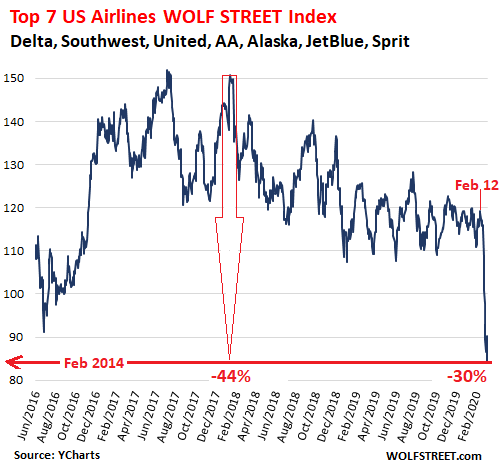“We are temporarily a company with no product and no revenue.”

By Nick Corbishley,
TUI, the global travel and vacation giant that owns six European airlines, 1,600 travel agencies, over 300 hotels and 14 cruise ships, desperately needs help. And it appears to have got it. On Friday, the company announced that the German government had approved a €1.8 billion loan to help keep the group afloat as COVID-19 brings the global travel sector to a literal standstill. The bridge loan, which still needs to be approved by TUI’s creditors, would be one of the biggest ever issued through German state-owned lender KfW.
“We are currently facing unprecedented international travel restrictions. As a result, we are temporarily a company with no product and no revenue. This situation must be bridged,” TUI CEO Fritz Joussen said in a statement. The same could be said for millions of companies around the world. But unlike TUI, many of them don’t have the ear of their national government.
Even as giant travel companies like TUI line up with airlines and cruise owners for multi-billion dollar bailouts, huge question marks loom over the global travel industry’s future.
The World Tourism Organization (UNWTO), in its updated assessment of the potential impact of COVID-19 — based on the optimistic assumption that the tourism industry will experience a swift recovery over the next 3-4 months — projects that for the whole year 2020, tourist arrivals will have fallen 20-30% from 2019, and international tourism revenues will have plunged by $300 billion to 450 billion, almost one third of the $1.5 trillion generated in 2019.
Taking into account past market trends, this would mean that between five and seven years’ worth of accumulated industry growth will have been wiped out in one fell swoop.
By contrast, the global financial crisis of 2008-09 resulted in a 5.4% fall in international tourism revenues, while the September 11 attacks in 2001 and the SARS outbreak of 2002-3 led to declines of just 2% and 0.4%. These were just momentary blips for an industry that has experienced two decades of almost uninterrupted growth, resulting in a three-fold surge in international tourism receipts, from $496 billion in 2000 to $1.5 trillion in 2019. Even during the worst year, 2009, the 5.4% fall in tourism receipts was cancelled out by a 5.7% resurgence in 2010.
What is happening now — the total collapse of global travel and tourism — has not happened before. As the UNTWO itself concedes, its own estimates “should be interpreted with caution in view of the magnitude, volatility and unprecedented nature of this crisis. SARS and the 2009 global economic crisis are the existing references, but this crisis is like no other.”
Even the scenario of a 20-30% fall in receipts — four to six times more than in 2009 — assumes that the virus will be contained within the next 2-3 months; and once it is, that everything will return to exactly how it was before. It assumes that the virus will be contained globally to such an extent that it allows for unlimited international mass travel and tourism for leisure and business to resume within the next 2-3 months. And it assumes that this large number of people are actually willing to travel within a few months.
But this is hard to imagine. And once things do end up at some sort of new “normal,” the global economy may be in the throes of a recession deeper and more enduring than the one suffered in 2009.
In the meantime, everything stands still. And the economic pain grows. Airlines have already taken a battering, having seen their passenger numbers virtually vanish, most of their planes grounded, and their share prices slump by anywhere between 50% and 70% over the past six weeks. The pain has barely just begun.
By the end of the year, the International Air Transport Association (IATA) expects “revenue passenger kilometers” (RPKS) — an airline industry metric that shows the number of kilometers traveled by paying passengers — to have slumped by approximately 27% in North America, 32% in Africa, 37% in Asia Pacific, 39% in the Middle East, 41% in Latin America, and 46% in Europe. In terms of passenger revenues, the impact is expected to range from just 4% in Africa to 50% in North America, 76% in Europe, and an eye-watering 88% in the Asia Pacific region.
On the ground, things look just as bad. The ten countries with the most reported cases of COVID-19 as of three days ago (China, the United States, Italy, Spain, Germany, Iran, the Republic of Korea, France, Switzerland and the United Kingdom ) account for 34% of world tourist arrivals and 53% of world tourism expenditure. Between them, China and the U.S. alone contribute 29% of total expenditure.
Some of these countries’ economies are massively dependent on the income and jobs provided by the tourism industry. In the case of the U.S., inbound tourism provides 10% of total exports. In France and Italy it’s 8% while in Spain it’s a stunning 16%. In some places such as the Canary Islands and the Balearics, tourism represents over a third of the local economy. For years WOLF STREET has been warning about Spain’s excessive dependence on tourism and the huge risk that dependence could pose in the event of a sudden fall in demand. We never thought the fall could be this dramatic.
In February, even before the restrictions on movement were put in place in Europe, Spain had already registered a 15% year-over-year fall in tourist visa applications. Easter, one of the busiest weeks for tourist arrivals in Spain, has already been ruined. If the crisis lasts as long as four months (it’s already lasted six weeks), it could end up costing the industry €45 billion in lost income, according to the industry group Exceltur. Millions of jobs are also on the line.
The same is happening all over the world, albeit to a slightly lesser degree in many places. Millions of jobs that have been created over the past ten years will be destroyed. UNWTO concludes its assessment by calling for protection of the most vulnerable segments such as SMEs, self-employed and the workers that fill the low paid, casual jobs the tourism industry specializes in creating.
Unfortunately, most of these groups don’t have armies of lawyers and lobbyists to represent them in the corridors of power. While corporations like TUI are well-practiced in the art of extracting money and other favors from government and central banks, small family-run hotels, travel agencies, restaurants and bars, drivers, guides , and the like — which make up the vast bulk of the tourism industry.
Source: https://wolfstreet.com
Disclaimer: We at Prepare for Change (PFC) bring you information that is not offered by the mainstream news, and therefore may seem controversial. The opinions, views, statements, and/or information we present are not necessarily promoted, endorsed, espoused, or agreed to by Prepare for Change, its leadership Council, members, those who work with PFC, or those who read its content. However, they are hopefully provocative. Please use discernment! Use logical thinking, your own intuition and your own connection with Source, Spirit and Natural Laws to help you determine what is true and what is not. By sharing information and seeding dialogue, it is our goal to raise consciousness and awareness of higher truths to free us from enslavement of the matrix in this material realm.
 EN
EN FR
FR

























